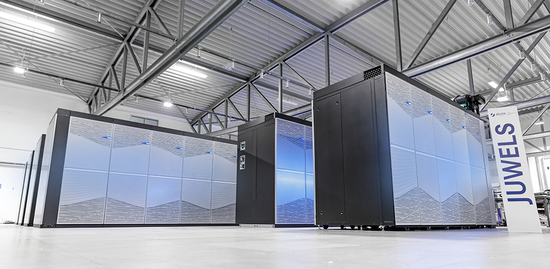PRESS RELEASES
JUWELS Booster Remains Europe’s Most Powerful Supercomputer, According to New Top500 List
Press Release 04/2021 –
The Booster module also placed 7th in the Green500 list, which ranks HPC systems based on the gigaflops achieved per watt of energy used, making the machine Europe’s most energy efficient HPC system.

The JUWELS Booster module is among the top-10 of the fastest supercomputers world-wide. Listed 8th in the latest TOP500 (June 2021), the system is the most powerful HPC system in all of Europe. The machine also placed 7th on the Green500 list, making it Europe’s most energy-efficient supercomputer. © FZ-Jülich/Ralf-Uwe Limbach.
The GCS HPC systems—Hawk (#18) at the High-Performance Computing Center Stuttgart (HLRS), the JUWELS Booster at JSC, and SuperMUC-NG (#17) at the Leibniz Supercomputing Centre (LRZ)—claim three of six top-20 positions held by European representatives in the latest Top500 list. Apart from the three GCS machines, two Italian installations—commercially used Dell EMC system HPC5, installed at Eni S.p.A., and IBM system Marconi-100 of the non-profit consortium CINECA—and Cray XC50 machine Piz Daint, run by the Swiss National Supercomputing Centre, are the only other European supercomputers among the 20 most powerful HPC systems on the globe. Supercomputer Fugaku, a Fujitsu system hosted at the Japanese RIKEN Center for Computational Science, remains the world’s fastest supercomputer.
With the TOP500 rankings of its three national HPC systems, GCS solidifies Germany’s position as the European leader in HPC space. The flagship supercomputers at the centres comprising the Gauss Centre for Supercomputing—HLRS, JSC, and LRZ—deliver a combined peak performance of just over 130 petaflops. This number includes approx. 12 Petaflops of peak performance delivered by the first module of the JUWELS installation at JSC, the JUWELS CPU system.
All GCS HPC systems are jointly funded by the German Federal Ministry of Education and Research, with 50 percent contributed by the federal states of Baden-Württemberg, Bavaria, and North Rhine-Westphalia respectively.
For a complete list of the Top500 rankings, click here.
The complete Green500 list is available here.
pdf version of this press release.
About GCS: The Gauss Centre for Supercomputing (GCS) combines the three national supercomputing centres HLRS (High-Performance Computing Center Stuttgart), JSC (Jülich Supercomputing Centre), and LRZ (Leibniz Supercomputing Centre, Garching near Munich) into Germany’s Tier-0/1 supercomputing institution. Together the three centres provide the largest and most powerful supercomputing infrastructure in all of Europe and serve a wide range of industrial and research activities across various disciplines. They also provide top-tier training and education for the national as well as the European High Performance Computing (HPC) community. GCS is the German member of PRACE (Partnership for Advanced Computing in Europe), an international non-profit association consisting of 26 member countries, whose representative organizations create a pan-European supercomputing infrastructure, providing access to computing and data management resources and services for large-scale scientific and engineering applications at the highest performance level.
GCS is jointly funded by the German Federal Ministry of Education and Research and the federal states of Baden-Württemberg, Bavaria and North Rhine-Westphalia. It has its headquarters in Berlin/Germany.
GCS PR Contact:
Regina Weigand (r.weigand@gauss-centre.eu)
June 30, 2021